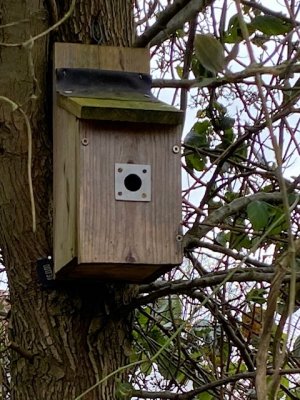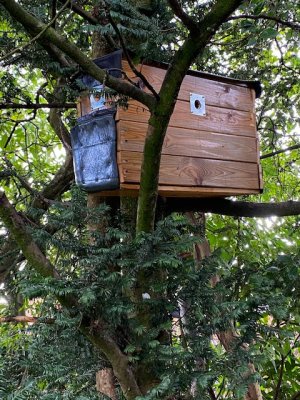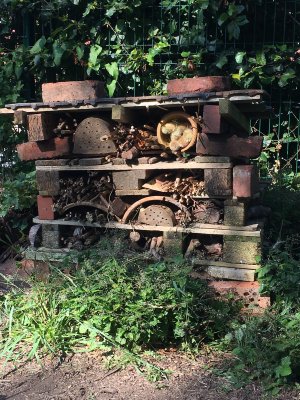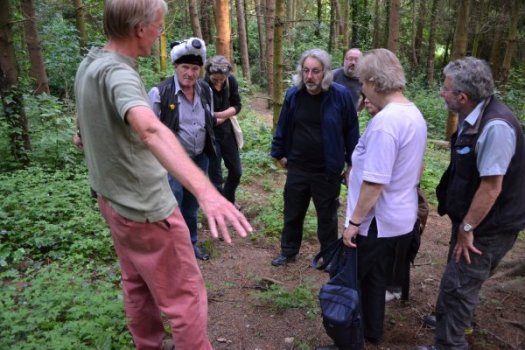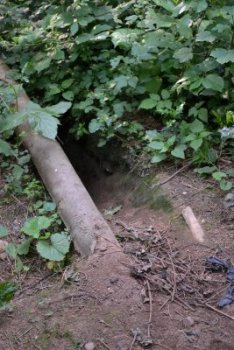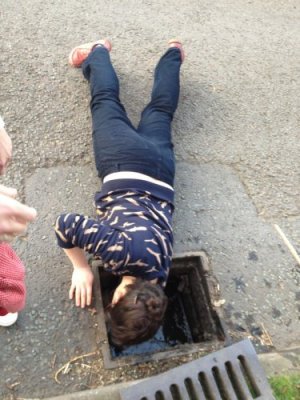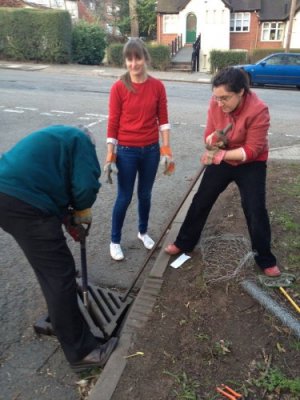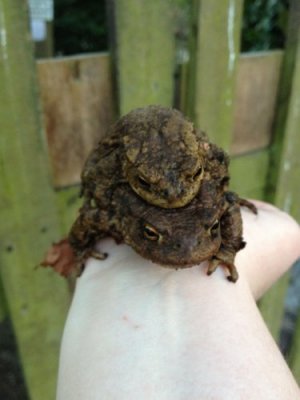|
Moor Pool Wildlife
Moor Pool Wildlife started in April 2013 in response to major building works taking place on the estate at that time. We’re making real progress in restoring and sustaining habitats for local animals such as frogs and toads, caterpillars and butterflies, small mammals, birds and bees – and the plants and trees that support them.
Scroll down to read about some of our projects and find links to information about other local ecology groups.
Please contact Mike Foster or Cathy Perry for further information about Moor Pool Wildlife. You can find us on Facebook as Moor Pool Wildlife Group – please like us!
Read the Moor Pool Wildlife Constitution.
Self isolating? Stuck at home with the kids? Bored? Download our ideas of things to do,
Meetings and events:
Postponed until further notice - Species recording at the Moor Pool on the last Saturday of each month during 2020, 10am – 11am, weather permitting
Meetings at Moor Pool Lower Hall from September onwards - dates tbc
24th - 27th April – City Nature Challenge 2020 Download poster here.
13th September – we will be taking part in Moor Pool Heritage Day which has the theme of ‘Hidden Nature’
24th October – we will be taking part in Moor Pool Memories at the Upper Hall
Moor Pool Wildlife projects
Ecology Survey 2020
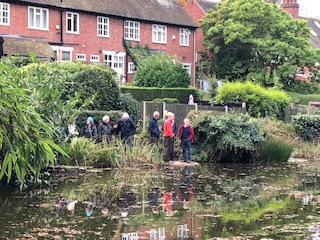 The Moor Pool Heritage Trust is keen to enhance the green as well as the built environment of the estate. They plan to commission an ecology survey of the Moor Pool area which we hope will result in some actions to improve habitat and encourage species such as toads and bats to return to the Pool. The MPHT have asked Moor Pool Wildlife to contribute to this by recording species during 2020. It’s a fantastic opportunity for us to learn about a wide range of species and we will be organising walks, talks and forays during the year.
The Moor Pool Heritage Trust is keen to enhance the green as well as the built environment of the estate. They plan to commission an ecology survey of the Moor Pool area which we hope will result in some actions to improve habitat and encourage species such as toads and bats to return to the Pool. The MPHT have asked Moor Pool Wildlife to contribute to this by recording species during 2020. It’s a fantastic opportunity for us to learn about a wide range of species and we will be organising walks, talks and forays during the year.
Bat boxes at Moor Pool 2020
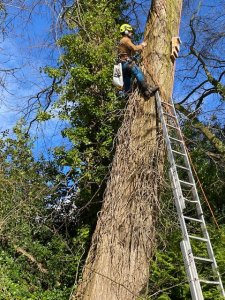 Four bat boxes were put up on a Black Italian Poplar next to the Pool in February. The boxes were kindly donated by the Wildlife Trust. We hope these will encourage bats to return to the Pool.
Four bat boxes were put up on a Black Italian Poplar next to the Pool in February. The boxes were kindly donated by the Wildlife Trust. We hope these will encourage bats to return to the Pool.
Places for Pollinators 2019
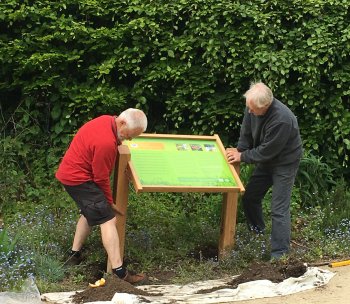 We were delighted that Nettlefold Garden’s pollinator border was accepted as one of West Midlands Butterfly Conservation’s ‘Places for Pollinators’! They supplied an interpretation board which was unveiled in May by their branch chair, Peter Seal.
We were delighted that Nettlefold Garden’s pollinator border was accepted as one of West Midlands Butterfly Conservation’s ‘Places for Pollinators’! They supplied an interpretation board which was unveiled in May by their branch chair, Peter Seal.
Nesting boxes 2019
Nesting boxes specially built by one of our members at the Kings Heath Shed were sold at Heritage Day in September.
Nettlefold Garden 2017 onwards
The garden is managed by Moor Pool Heritage Trust and was developed using Pocket Park funding. It was conceived as a safe space for local residents and children while ensuring that it is also wildlife friendly. The planted borders include plants for caterpillars as well as for butterflies and for this reason some nettlebeds and bramble patches have been deliberately retained. The woodland walk is planted with native species and we are trying to develop a meadow area. There is a ‘fungery’ and a bug hotel. No pesticides or artificial fertilisers are used.
Nesting boxes suitable for tits and robins were put up in spring 2019 and a further communal box for sparrows in spring 2020.
Badger Watch 2015
Led by Nigel Tolley, chairman of West Midlands Badger Trust on June 25th, the group made an expedition to a local badger sett to learn about these fascinating creatures.
Toads crossing 2013
As recently as 2013, toads would migrate to the Moor Pool in such numbers that local residents would go out at night to help them across the road or out of drains. The low number of toads we see today is causing concern.
Wildlife recording
The Wildlife Trust for Birmingham and the Black Country recommend two sites for recording wildlife species – iNaturalist and EcoRecord.
iNaturalist is an international organisation that began in California but is now used by over 1 million people worldwide and has recorded over 32 million observations. Simple and easy to use, you upload a photo of what you have observed and the software will suggest an identification. Your observation will be verified by a naturalist. Moor Pool Wildlife is using iNaturalist in our Ecology Survey. Local observations added to iNaturalist are imported into EcoRecord.
EcoRecord collects, collates and makes available information about the wildlife, wildlife sites and habitats of Birmingham and the Black Country and currently has over 500,000 species records on its database. These records come from many sources, ranging from professional ecologists to amateur expert naturalists to other wildlife enthusiasts.
Why record wildlife species?
EcoRecord provides an information service to a wide range of users such as local authorities, statutory agencies, ecological consultants, national and local recording schemes and others with a an interest in the wildlife of Birmingham and the Black Country. Such information is a consideration in planning applications. A significant proportion of these species records come from YOU! Without the contribution of volunteer recorders there would not be the knowledge of the biodiversity of Birmingham and the Black Country and the understanding of its natural environment. It is important you submit your observations as these all add up to give a clearer picture. You may be used to seeing various birds and species in your garden or around Moor Pool but unless they are reported there may be a gap on EcoRecord.
Local ecology groups, wildlife information and local places of interest
Amphibians
Birmingham and Black Country Amphibian and Reptile Group
How to build a Hibernaculum – How to build a home for amphibians in your own garden.
Badgers
Badger Trust West Midlands
RSPCA pages on badgers - and you can also download the 'Living With Badgers' leaflet.
Bats
Brumbats
Bats in Houses Natural England Guidance – find out about bats and the law
Birds
West Midlands Bird Club – manages the nature reserve adjacent to Pereira Road Allotments (keyholder access only)
Butterflies and Moths
West Midlands Branch of Butterfly Conservation
Wildlife Trust
Wildlife Trust for Birmingham and the Black Country – find them online or journey to the Centre of the Earth, Winson Green.
Gardens
Martineau Gardens – a great example of organic and wildlife gardening.
Winterbourne House and Garden – former home of John Sutton Nettlefold who conceived the idea for the Moor Pool Estate. The gardens are a botanical garden for the University of Birmingham.
|
 The Moor Pool Heritage Trust is keen to enhance the green as well as the built environment of the estate. They plan to commission an ecology survey of the Moor Pool area which we hope will result in some actions to improve habitat and encourage species such as toads and bats to return to the Pool. The MPHT have asked Moor Pool Wildlife to contribute to this by recording species during 2020. It’s a fantastic opportunity for us to learn about a wide range of species and we will be organising walks, talks and forays during the year.
The Moor Pool Heritage Trust is keen to enhance the green as well as the built environment of the estate. They plan to commission an ecology survey of the Moor Pool area which we hope will result in some actions to improve habitat and encourage species such as toads and bats to return to the Pool. The MPHT have asked Moor Pool Wildlife to contribute to this by recording species during 2020. It’s a fantastic opportunity for us to learn about a wide range of species and we will be organising walks, talks and forays during the year.  Four bat boxes were put up on a Black Italian Poplar next to the Pool in February. The boxes were kindly donated by the Wildlife Trust. We hope these will encourage bats to return to the Pool.
Four bat boxes were put up on a Black Italian Poplar next to the Pool in February. The boxes were kindly donated by the Wildlife Trust. We hope these will encourage bats to return to the Pool. We were delighted that Nettlefold Garden’s pollinator border was accepted as one of West Midlands Butterfly Conservation’s ‘Places for Pollinators’! They supplied an interpretation board which was unveiled in May by their branch chair, Peter Seal.
We were delighted that Nettlefold Garden’s pollinator border was accepted as one of West Midlands Butterfly Conservation’s ‘Places for Pollinators’! They supplied an interpretation board which was unveiled in May by their branch chair, Peter Seal.